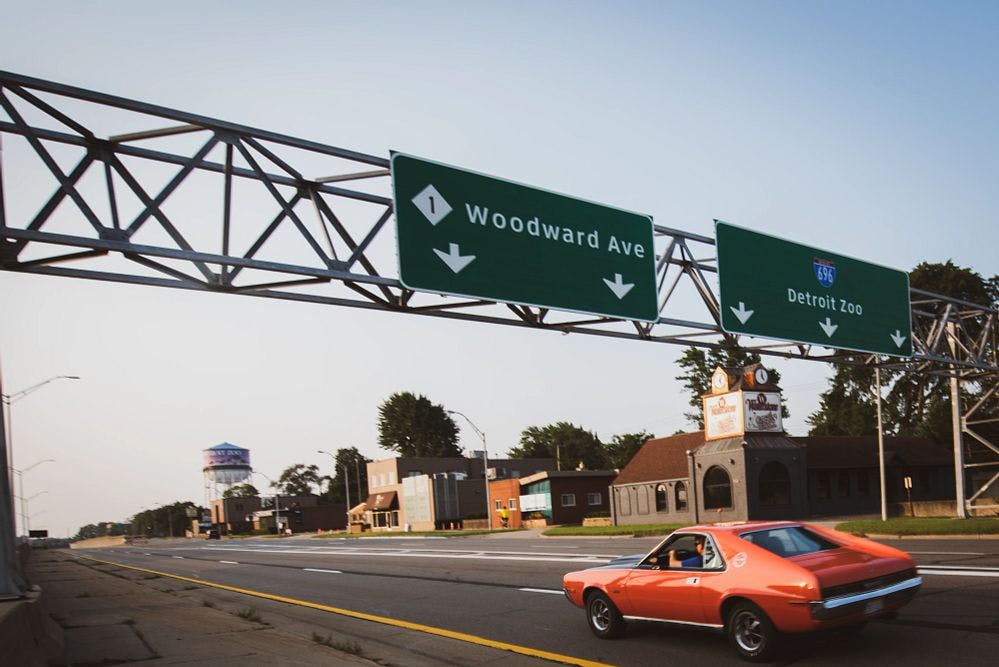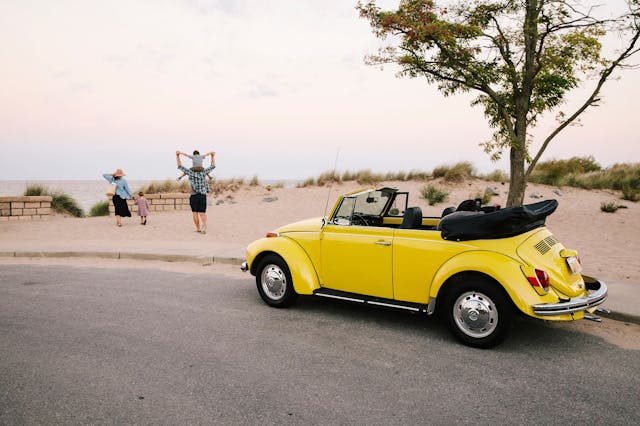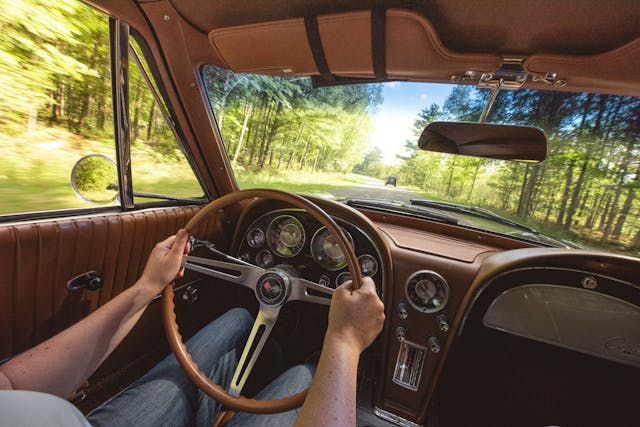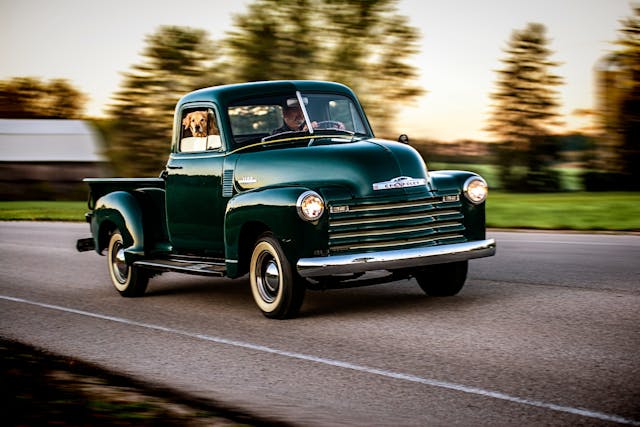Michigan Relaxes Driving Restrictions for Vintage Cars
Hopping into the driver’s seat of a car is a freeing feeling at any age. A loose grip on the wheel and light touch on the pedals give us the capability to go just about anywhere when properly equipped—well, assuming your classic vehicle doesn’t have restrictions on usage based on your registration. Luckily, vintage car owners in Michigan are primed to enjoy this driving season and many more with a little more freedom thanks to the passing of House Bill 4183. Governor Gretchen Whitmer signed the bill, which vastly expands the ability to use classic cars, into law on April 2nd with immediate effect.
According to the way the law was previously written, a vehicle with historic or authentic license plates could only be used for “participation in club activities, exhibitions, tours, parades, and similar uses, including mechanical testing, but is not used for general transportation.” The new legislation expands the definition of “exhibition” considerably. The full language reads:
Sec. 20a. “Historic vehicle” means a vehicle that is over 25 years old and that is owned solely as a collector’s item and for participation in club activities, exhibitions, tours, parades, and similar uses, including mechanical testing, but is not used for general transportation. For purposes of this section, use of the vehicle during the period from Memorial Day weekend through Labor Day each year is considered an exhibition.
Plenty of drivers ignored the prior law, but there was always the chance that law enforcement would issue a citation for usage outside of the guidelines. That’s a worry no more, all thanks to an enthusiast just like you and me.

This law stands as a testament to what can be done by grassroots classic car owners, as it was not a lobbying group or organization that made this happen, but rather one person who thought the way the law was written was too much and decided to do something about it. That person was John Russell of Traverse City, Michigan.
“It’s been a long road, but totally worth it,” said Russell. It all started with a group being ticketed for participating in the Woodward Dream Cruise, as the informal driving event did not technically fulfill the letter of the law. The group protested and gained enough traction to amend the ruling in June of 2012 to allow unlimited use for the month of August.


Russell saw this as an opportunity. “That 2012 ruling made me call up my senator and ask why we had restrictions at all.” From there it turned into a letter writing campaign and spooled up into a full-scale lobbying effort before long. Despite some lulls and gaps in progress for the bill, John didn’t give up and before he knew it he was testifying in front of the Michigan state legislature, to which he said, “We aren’t asking for special favors, we are just asking to drive our cars. This is the automotive capital of the world. Why are we restricting people from driving to get ice cream in cool cars?”

Russell’s patience paid off. He got word on April 1st that the bill had passed, and had to reach out to his government contacts to confirm they weren’t pulling his leg. They weren’t, and that meant it was cause for celebration. It took years to get the ear of the right representative who would put together and introduce a bill, and then a full decade after that to complete the process to see said bill signed into law. Despite the wait, the timing is perfect, as owners are just starting to bring out their seasonally-stored vehicles and prepare to enjoy the driving season—now with a little extra driving.

With this win under his belt, Russell’s first question to State Representative John Roth and the bill’s other sponsors was “we can come back in a few years and ask for no restrictions, right?” Russell thinks he has the the right combination of evidence to make that happen, but in the meantime, those of us in Michigan are preparing for a celebratory drive this Memorial Day weekend.
***
Check out the Hagerty Media homepage so you don’t miss a single story, or better yet, bookmark it. To get our best stories delivered right to your inbox, subscribe to our newsletters.



O ye of little regulation! British Columbia, with its single provincial liability insurance plan (Insurance Corporation of British Columbia), a public agency, allows two distinct types of special plates/registrations: Collector and Vintage. Each has restrictions, and each provides liability insurance at a tenth of the regular rate or less.
With Collector plates, you can drive a 25+-year-old car or bike any time you like as long as you are not driving to or from work, school, or college. The car must not only be either original or modified (and inspected), it must look pristine too — right down to the correct radio, etc. Accidents in such vehicles occurring at peak weekday hours are generally investigated and if you were on your way to or from work or school, your claim will be denied. It is intrusive and pettifogging at worst, but it sure is worth it to be able to fully insure your expensive classic for $200-300 a year all in.
Vintage plates allow any 30+-year-old car or bike, regardless of condition or appearance, to drive to or from shows, parades, club events, or a mechanic. Very cheap, very restrictive, and fairly consistently enforced.
Overall a good deal. But it requires a public insurance provider and its attendant bureaucracy to make it happen. And despite our climate and demographic similarities to California, proper car insurance is actually cheaper here for most (not all) classes of drivers and vehicles. A single public provider does create efficiencies, it seems. Not something most Americans will want to hear, I suppose. And given the way govt works there, YMMV…
I live just south of you, in the great state of Washington, and we can drive anything we want, anywhere, any time. No insurance, no problem! Held together with duct tape, no problem! Plastic sheets for windows, no worries! Live in your car and it has no windows, functioning lights, or mirrors – that’s ok too! And I’m not being sarcastic.
I think your point illustrates mine quite well! Orderly pursuit of the public good is both our glory and our bugbear on this side of the border; and an your side…
On a slightly related note- speaking of the advantages of having a historic or year of manufacture plate on your car (reduced fees), what is the advantage of having a “dealer” plate? I see a lot of people in my area that have them, and I’m pretty sure most of them aren’t dealers in the traditional sense. I’m guessing it has something to do with insurance? Just curious.
Dealer plate people are cheating the system & should be busted for it
This “parade provision “ exists in all states and only if you have Historic tags; which of course are a fraction of the cost of a regular tag. I have had my 1968 Impala registered in Maryland, Florida and South Carolina with “regular “ tag so I can drive it daily without hassle.
I’ve never owned a classic car, but I don’t understand why there’d be a restriction at all? And why not just get regular plates? Is there a benefit of having historic or authentic plates that would’ve made it worth putting up with those crazy restrictions? Enlighten me.
Cost of insurance, typically. Way, way cheaper for special-plated, use-restricted vehicles because they won’t be getting into accidents commuting at rush hour…
In Minnesota, your car qualifies for “collector” plates when it’s 25 yrs old, and it’s a one time registration fee — the plates never expire. No real usage restrictions that I remember, but you must have at least one other vehicle with standard registration, which is then assumed to be your primary transportation.
I’m shocked the Governor of Michigan signed anything that could make some degree of sense. To be fair most politicians of any party qualify for this comment.
Appreciate your dragging partisan politics into a topic where we should be celebrating a win, a rare bipartisan one in fact, something. If you follow the link to the bill, it was passed with a veto proof majority in both chambers. Whether or nit Gov. Whitmer would have signed it in a close passage is a moot point.
YOU GO, Governor Whitless.
“With this win under his belt, Russell’s first question to State Representative John Roth and the bill’s other sponsors was ‘we can come back in a few years and ask for no restrictions, right?’” My advice is: don’t get greedy. If you are paying a significantly less than a normal license fee, you should not expect there to be no restrictions at all, realistically.
Another idea is a separate class of license, as is available in Illinois. The regular antique plate costs very little, but always limits driving the vehicle to going to shows, service stations, etc. A second class, which costs one-half the full, normal license cost, comes with restricted driving for only 3 months, December thru February – which seems quite reasonable to me. Perhaps other states could be persuaded to do something like that?
What you are describing is what the Michigan system has now become. There are three options for registration: Standard (unlimited usage), Historic (unlimited between Memorial and Labor Day), and Authentic (unlimited between Memorial and Labor Day). Only difference between historic and authentic is the usage of a vintage plate vs a new state-issued one.
Historic and authentic registrations are cheaper than standard, but the usage restriction previously has been quite strict.
Well done Michigan! Enjoy the drive…unless you’re convinced the bill is a chicken-wing conspiracy between big government, big oil, big insurance, big classic car repair, and big tire and alignment to cajole people to enjoy the luxury of owing an extra and interesting car. If that’s you, I hope you find something fun to do this driving season.
Look up the show that jay leno did with president Biden, driving around the white house grounds in Biden’s corvette. You can tell from the conversation that Biden is not going to screw over classic car owners. Kudos to jay leno for lobbying for us.
The true enthusiasts of having an historic etc. Car are not likely to be driving their old car daily. That kind of defeats the purpose of enjoying the drive. I have a 33 year old car with 51000 documented miles, part of the enjoyment is keeping the authenticity of the car for as long as possible. As the prices of a new car today keep increasing it won’t be long before we are all driving historic automobiles because we can’t afford to replace them.
Go Big Gretch!!!
Appreciate the write up on this, but wish it shared more specifics on what’s allowed now.
I’m not totally clear on how this affects registration costs. Does this mean my two Hagerty insured vehicles, a 1996 Z3 and a 1998 XK8 ($275 annual tab fee) won’t be subject to a renewal fee for a license tab every year? The one time $35 historic plate is good for the duration of my ownership of the vehicle?
TIA
Thanks for ALL your Hard Work in getting this Bill/Legislation Passed Guys, it was Long Overdue for us Pure Michigan Residents !!!
Cool. Michigan (And Hagerty) realize a majority of the owners of these cars have ten years (at most) to enjoy them. and nobody in their families will want them. Happy Motoring!
Do you mind elaborating on your theory? Are you figuring that we won’t be able to drive in 10 years or all collector car owners will be dead and gone by then?
Neither theory I necessarily subscribe to, but I’m willing to have my mind changed.